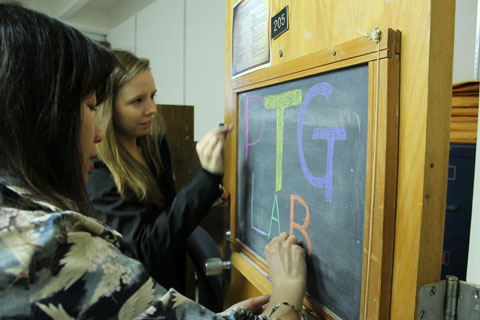
 |
| Assistant Professor of Psychology Dr. Kanako Taku studies the personal growth that happens after a person recovers from trauma. Leah LaLonde, an undergraduate psychology student, has been studying PTG with Dr. Taku for four semesters. |
Nearly everyone has heard of post-traumatic stress disorder. But what about post-traumatic growth?
Dr. Kanako Taku, assistant professor of psychology, is a leading scholar on post-traumatic growth (PTG) and has conducted research on the subject for 11 years on how people change psychologically, cognitively, socially and spiritually after traumatic events.
In her PTG Lab, undergraduate psychology students at Oakland University can join in on the exploration of this relatively uncharted territory. They are currently visiting local high schools to see if this growth after trauma is possible for the younger generation, particularly for those who have been bullies and inflicted harm on others.
This is fifth-year Leah LaLonde’s fourth semester studying PTG in the lab.
“It’s a positive spin on experiences after trauma,” LaLonde said. “The important thing is that … most people recover from trauma or stressful life events, but the post-traumatic growth is beyond the recovery. So its psychological benefits are besides just recovering from the trauma or whatever happened.”
She and four others are currently studying this occurrence in the Rochester area’s high school students.
“I’m looking at how their perception of growth might change from the adults and find a different way to measure PTG with adolescents because they’re just at such a different time in their life than adults,” LaLonde said. “So what they might think psychological growth is might be different from an adult.”
LaLonde and fellow lab members visit the high schools three times. First they pass out a 10-page survey on variables such as demographics, self-esteem and self-reflection habits. Next they retrieve the survey and give an interactive presentation on PTG. Three weeks later they return one last time for a second survey and compare responses from before and after the PTG discussion.
Junior and psychology major Aundreah Walenski, who has been in the lab for two semesters now, says she finds this topic fascinating.
“We don’t think about a child’s growing from something really bad happening in their lives,” Walenski said.
When it comes to traumatic events, we don’t tend to think of younger victims the same way as adults, Walenski said, particularly when it comes to bullying. The data they are currently collecting explores this and a previously unasked question: victims may be able to experience PTG, but can those who inflict the damage?
The psychology students are also exploring cross-cultural differences, learning from differences around America and using data specifically from Taku, who was born and raised in Japan.
“We’ll compare American high school students in the local area to Japanese students,” LaLonde said. “[The Japanese culture] is more collectivist in nature, so they view growth differently overall.”
For example, one of the domains of PTG is spiritual change, which the Japanese never report, according to LaLonde. Americans also tend to think more individualistically, whereas the Japanese have more of a community mindset.
Whatever the culture, everyone reacts differently to tragedy, LaLonde said, and a lot of it depends on how much a person knows or thinks about it. It’s their goal to spread as much information as possible.
The lab is a place for growth, no trauma necessary
Taku regularly publishes her research, and encourages her students to publish research as well. They continuously update Taku’s website with their activities, research and presentations.
“She wants to prepare us for graduate school or whatever we’re going into,” LaLonde said. “She kind of replicates the experience of grad school.”
When she first came to Oakland, LaLonde said her interest in psychology was new and uncertain. It was only when she joined the PTG Lab that she realized her love for psychology and what it would mean to get into grad school. It’s her fourth semester in the lab now and one of her favorite places on campus.
“One decision has changed my education,” LaLonde said. “It’s so different than going to class, reading all these psychology terms. This is applying yourself and doing actual research.”
Walenski says the lab, now the focus of her own life, is a great opportunity for her to grow as a person and psychologist.
“I think I’ve learned the most from her and the people I’ve worked with than really anyone in my life besides my parents,” Walenski said. “Dr. Taku has been a very influential person in my life — I’ve learned a lot about psychology and actual applied science, not just the theoretical approach.”
“She (Taku) really pushes you do go to the next level,” LaLonde said. “If she thinks you can do better, she’s going to push you to do better.”
Both Walenski and LaLonde plan to move on to grad school after graduation. Walenski will apply to clinical Ph.D. and master programs. Her goal is to eventually become a therapist for adolescents going through trauma and working with the family dynamic, exploring how family plays a role in PTG.
LaLonde, who will be graduating in May, said she plans on working in the lab a little bit during the summer and applying to grad school next fall, eventually making her way to professional clinical psychology programs.
“However I get there, I hope that eventually I can work with children, and adolescents, and do therapy assessments and that kind of thing,” LaLonde said. “I’m still not 100 percent decided where I’m going, but I’m really interested in child trauma and psychopathology.”
There’s so many different ways to go with it, LaLonde said, but thanks to Taku and the lab, she feels more than prepared.